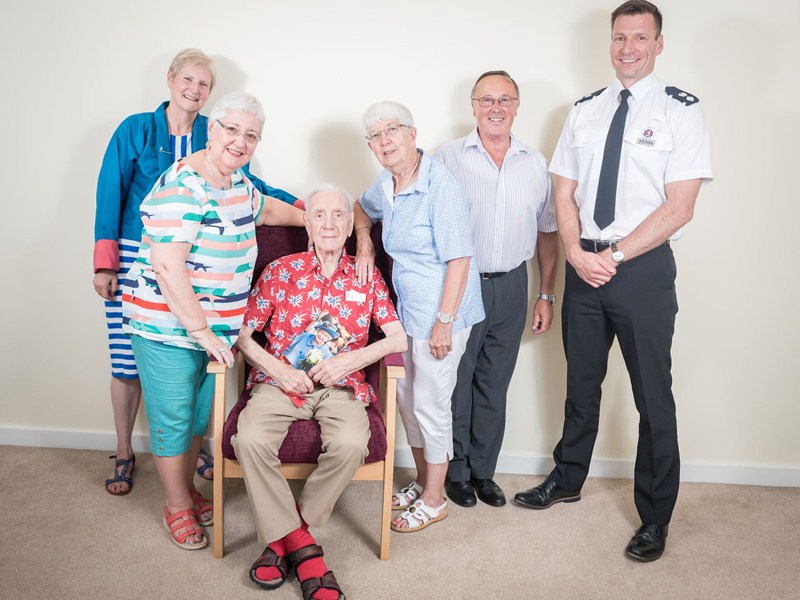‘WHAT do you make of the MooMoo club?’ asked Stanley Kirby on the occasion of his 100th birthday last week. Was he planning a big night out?
‘You want to be there some nights,’ he added. ‘When they close down at two in the morning, such a bloody noise! Why can’t they come out of these functions quietly?’
But Mr Kirby is still full of fun as he reached three figures on Friday [July 6] at his home in Cadogan Gardens, Tunbridge Wells – a few hundred yards from MooMoos.
He was visited by Chief Superintendent Simon Wilson of the West Division and representatives of the National Association of Retired Police Officers, Caroline Riddle and Ian Paterson.
During the visit he received his special centenarian’s card from the Queen. ‘She remembered. Thank you, ma’am,’ he smiled, dangling the card from his fingers. ‘Now she’s sitting on my knee.’
A year after his father had returned home from World War I missing a leg, Mr Kirby was born in Croydon in 1918. ‘I wonder why that was,’ he mused with a twinkle in his eye.
He had three brothers and a sister, and attended Archbishop Tenison’s School – he is now their oldest alumnus. He joined the police in west London in 1938 and married Mary Walmsley the following summer. Mary passed away in 2000.
They had three children: Judith was born in 1940 and Jennifer – who also lives in Tunbridge Wells – and her twin James in 1947, though James died after three weeks.
Mr Kirby recalled his early police career directing traffic at Hammersmith Broadway ‘like conducting an orchestra’ with eight traffic patrols operating at once.
He never liked pulling the first shift of the day, or ‘early term’ – ‘I used to hate getting out of bed at half past four’ – although it has clearly done him no harm.
He harked back to the summer of 1939, being the cox of the Metropolitan Police Athletic Association’s rowing eight at the Henley regatta.
He served in the Royal Navy from 1942-46, first aboard HMS Verdun, a destroyer that escorted merchant ships down the east coast from the Firth of Forth to the Thames.
This perilous task involved negotiating the Norfolk coastline, which was known as ‘E-Boat Alley’ because the German attack craft came straight across the North Sea.
Then he applied his law enforcement skills as a Chief Petty Officer on the aircraft carrier Argus before returning to the police, and was promoted to sergeant in 1951.
He was stationed in Bedfont, Hounslow and eventually Twickenham, where he was in charge of matchday operations at the rugby stadium.
‘I started at eight in the morning and didn’t get finished until gone midnight. These are the problems of being a policeman’
‘The little boys used to get so drunk, it was their first chance, they would knock it back,’ he recalled fondly. ‘We were told, ‘That’s what we employ you for, keep these boys quiet.’
He told of one vexing occasion when a spectator died high up in the stands during a match. ‘The doctor said, ‘I can’t take him’. The ambulance turned up, said the same thing: ‘He’s dead’.
‘So I had to find a mortuary, get a police van round to take him away. You have to go through his pockets to find out who he is. I had to try to get hold of his widow, up in Derwent, Yorkshire. Then it’s ‘where’s his car?’
‘I started at eight in the morning and didn’t get finished until gone midnight. These are the problems of being a policeman.’
After leaving the force he became an educational welfare officer, a role he did not relish.
He said: ‘I used to visit these families and they would say, ‘The state will keep me, I don’t have to go to school’.
‘The children would shout up, ‘It’s Mr Kirby’ and their parents would say ‘well tell him to b****r off!”
These days people are much more appreciative of his public service over the last 80 years.
He received a card from the Chief Constable of Kent Police, Alan Pughsley, while Cressida Dick, the Metropolitan Police Commissioner, wrote a letter of congratulation.
She told him: ‘The policing world may have changed since you started your career.
‘However, we must never forget to recognise the history, principles and people like you which have been our foundations and have made British policing so admired worldwide.’
The next day there was a ‘bunfight’ at the Nevill Golf Club for more than 40 members of his family, including his daughters, two grandchildren and three great grandchildren. His 95-year-old sister could not make it down from Accrington.
So what is the secret of Mr Kirby’s longevity? ‘Leave pretty girls alone,’ he confided with a cheeky smile, adding: ‘I’m not totally abstinent but when I was in the Navy I got in the habit of having pints laid out in front of me and I used to get sloshed.
‘But in the police you see what drink can do to a family, and I didn’t drink much after that.’
PICTURE: ROYAL APPOINTMENT: Stanley Kirby receives his card from the Queen, flanked by his sisters Jennifer (left) and Judith; Chief Superintendent Simon Wilson (far right) came to meet him with retired officers Caroline Riddle and Ian Paterson








